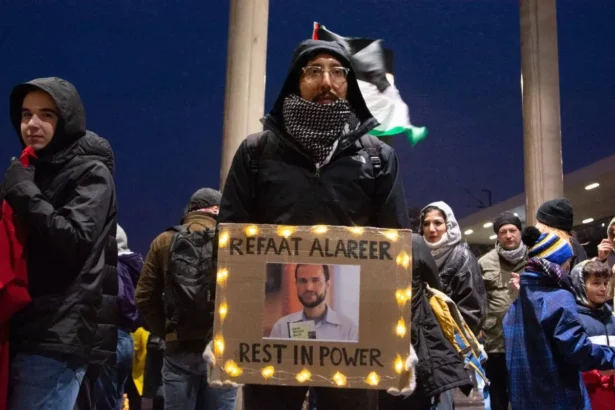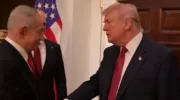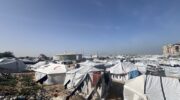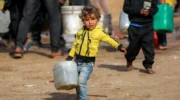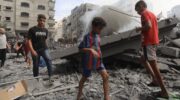The author and academic Refaat Alareer was killed in an Israeli airstrike a year ago. A posthumous collection of his work, If I Must Die, tells the stories of Gaza in a plea for change
By Sarah Aziza, Reposted from The Guardian
In the face of siege and war in Gaza, the writer and educator Refaat Alareer fought for his people’s right to narrate their experiences and history. “As a Palestinian, I have been brought up on stories and storytelling,” writes Alareer. “It’s both selfish and treacherous to keep a story to yourself.”
First written in 2022, these lines now sit at the heart of If I Must Die, a posthumous collection from Alareer’s eclectic and compelling oeuvre. Published by OR Books to mark a year since the writer’s death by an Israeli airstrike in Gaza, If I Must Die contains a selection of journalism, literary criticism, essays and poems written between 2010 and 2023. Taken together, they provide a glimpse into a restless political and literary mind, one that was still rising to the height of its powers.
In so many ways, the struggle in Palestine for land and rights has to be fought metaphorically and verbally … to shatter Israeli narratives of a land without a people, of a people without roots, of a people which never existed at all … through this writing, we not only assert our existence, but envision our future.
Even as Alareer sought to cultivate Palestinian storytellers, he was equally committed to fostering a critical Palestinian readership. Encompassing works spanning from The Merchant of Venice to Charles Dickens and the Israeli Jewish author Yehuda Amichai, Alareer’s syllabuses invited his students to wrestle with their own artistic, moral and national inclinations.
In the essay Gaza Asks: When Will This Pass? Alareer recalls: “To many of my students, [Shakespeare’s Jewish character] Shylock was beyond repair. Even Shylock’s daughter hated him!” However, with time, discussion and close reading, Shylock became recognizable to his students as a character who endured “an apartheid-like society [and] had to choose between total submission and humiliation … and resisting by the means available to him. He chose to resist, just like Palestinians do nowadays.”
While If I Must Die defends and demonstrates the power of storytelling, it is also shadowed with growing doubt. As the title suggests, the book is shot through with death, its chronological chapters proceeding through years of violent, compounding siege.
Following his own instructions to his students, Alareer’s reportage and criticism lean on storytelling, arraying the impact of occupation in granular, human terms – an elderly woman with cancer denied a permit to travel for healthcare, the Palestinian corpses held captive in Israeli prisons, the agony of a father forced to ration his child’s food. He declares: “There is no normal in Gaza. We never have normal days, because even when we go back [after a war] we go back to the siege, the occupation, to dying slowly.”
As If I Must Die progresses, the situation in Gaza grows more desperate, and Alareer’s defiance jostles with despair. Read in 2024, Alareer’s lamentations from years past are chillingly prescient. In a 2014 essay, Alareer considers his nieces and nephews, left traumatized and fatherless by an Israeli airstrike: “Unless Israeli war criminals are brought to justice and the occupation ends, my fear is these children will grow up feeling they were betrayed by the world.”
Eight years and some pages later, Alareer grieves: “[My daughter] Amal is now two wars old.” He wonders: “When will this pass? … How many dead Palestinians are enough?” After more than a year of what growing numbers of experts consider to be a genocide, this question hits with the weight of Gaza’s innumerable and ongoing loss.
If I Must Die concludes with several post-7 October dispatches, pages which throb with both Alareer’s and the reader’s dread. “Israel [is] heading toward genocide,” he declared on 13 October, decrying the Western world’s overwhelming support for the bombing in Gaza, and what he saw as its refusal to recognize the historical or political context for the events of 7 October.
In the early hours of the still-unfolding attack, he told the BBC: “This is exactly like the Warsaw Ghetto Uprising. This is the Gaza ghetto uprising against 100 years of European and Zionist colonialism and occupation,” adding that such an operation was “legitimate and moral”.
These three words attracted widespread vitriol. Soon after, he was singled out by the pro-Israel opinion writer Bari Weiss for his sarcastic response to a debunked story that Hamas had burned babies in ovens. Weiss accused him of mocking dead Israeli children, and her large online following unleashed a flood of rape and death threats against Alareer.
But such were the least of Alareer’s concerns by then. Displaced with his family multiple times in the first few weeks of the genocide, he described a Gaza of “unprecedented horror” in which no place was safe and hunger was already hollowing his children’s faces. In subsequent interviews and posts, he recorded what were, at the time, shocking escalations of violence, such as the bombing of schools and hospitals.
“Israel long ago created the concentration camp,” reads an entry from 26 October 2023. “But now this is an extermination camp.”
Less than a month later, Alareer would be dead, along with his brother, his sister, four nephews, and a neighbor. The airstrike that killed them on 8 December 2023 came one day after Alareer received a threatening phone call from the Israeli military, prompting him to relocate from a humanitarian shelter to his sister’s home, where the bomb found him anyway.
The anthology both answers and extends the imperative of its eponymous poem to “tell [Alareer’s] story”. But the author calls readers toward a more expansive responsibility:
The promise was that [telling the stories of Gaza] will effect change and that policies, especially in the United States, will be improved. But honestly, will they? Does a single Palestinian life matter? Does it? Reader, as you peruse these chapters … will you make this matter?
This question was penned in 2022. Alareer is no longer able to witness how the world fulfills, or fails, this plea.
Sarah Aziza is a Palestinian American author who splits her time between New York City and the Middle East. Find more of her works here.
RELATED:
- The unpublished genocide diaries of Refaat Alareer
- What we are seeing in Gaza is a ‘repeat of Auschwitz,’ says genocide expert
- Israel’s war on Gaza is the deadliest conflict on record for journalists
- Israel advocate Bari Weiss, prominent in the “anti-cancel-culture” movement, has a history of working to cancel voices she dislikes
- Israel’s attacks on Gaza bookshops are an attack on Palestinian culture

